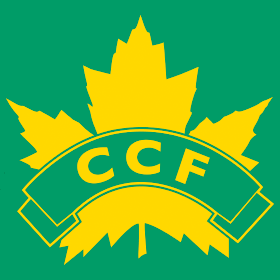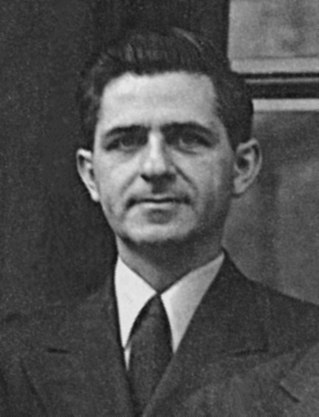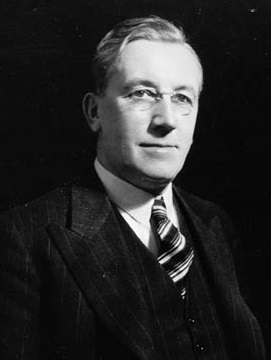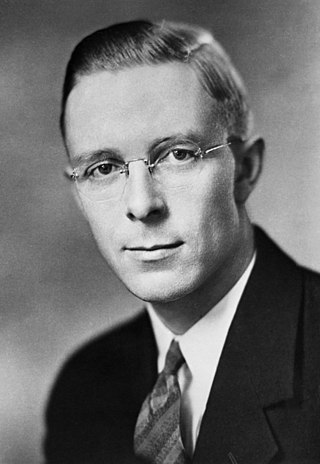Related Research Articles

The Co-operative Commonwealth Federation was a federal democratic socialist and social-democratic political party in Canada. The CCF was founded in 1932 in Calgary, Alberta, by a number of socialist, agrarian, co-operative, and labour groups, and the League for Social Reconstruction. In 1944, the CCF formed one of the first social-democratic governments in North America when it was elected to form the provincial government in Saskatchewan.

Thomas Clement Douglas was a Scottish-born Canadian politician who served as the seventh premier of Saskatchewan from 1944 to 1961 and Leader of the New Democratic Party from 1961 to 1971. A Baptist minister, he was elected to the House of Commons of Canada in 1935 as a member of the Co-operative Commonwealth Federation (CCF). He left federal politics to become Leader of the Saskatchewan Co-operative Commonwealth Federation and then the seventh Premier of Saskatchewan. His government introduced the continent's first single-payer, universal health care program.

The Ontario New Democratic Party is a social democratic political party in Ontario, Canada. The party sits on the centre-left of the political spectrum and currently forms the Official Opposition in Ontario following the 2018 general election. It is a provincial section of the federal New Democratic Party.

The Communist Party of Canada is a federal political party in Canada. Founded in 1921 under conditions of illegality, it is the second oldest active political party in Canada, after the Liberal Party of Canada. Although it does not currently have any parliamentary representation, the party's candidates have previously been elected to the House of Commons, the Ontario legislature, the Manitoba legislature, and various municipal governments across the country.

David Lewis was a Canadian labour lawyer and social democratic politician. He was national secretary of the Co-operative Commonwealth Federation (CCF) from 1936 to 1950 and one of the key architects of the New Democratic Party (NDP) in 1961. In 1962, he was elected as the Member of Parliament (MP), in the House of Commons of Canada, for the York South electoral district. While an MP, he was elected the NDP's national leader and served from 1971 until 1975. After his defeat in the 1974 federal election, he stepped down as leader and retired from politics. He spent his last years as a university professor at Carleton University, and as a travel correspondent for the Toronto Star. In retirement, he was named to the Order of Canada for his political service. After suffering from cancer for a long time, he died in Ottawa in 1981.

Wilbert Ross Thatcher, was the ninth premier of Saskatchewan, serving from May 22, 1964 to June 30, 1971. He led the Saskatchewan Liberal Party in four general elections, in 1960, 1964, 1967 and 1971. Thatcher was defeated in his first election in 1960, but won the next two elections in 1964 and 1967 with majority governments. Following his defeat in the general election of 1971, he retired from politics and died shortly afterwards.
The Saskatchewan New Democratic Party (NDP) is a social democratic political party in Saskatchewan, Canada. While the party is affiliated with its federal New Democratic Party, the party is considered to be a "distinctly homegrown" party given the role of the province in its development and the party's history in the province.

Major James William Coldwell was a Canadian democratic socialist politician, and leader of the Co-operative Commonwealth Federation (CCF) party from 1942 to 1960.
There have been various groups in Canada that have nominated candidates under the label Labour Party or Independent Labour Party, or other variations from the 1870s until the 1960s. These were usually local or provincial groups using the Labour Party or Independent Labour Party name, backed by local labour councils made up of many union locals in a particular city, or individual trade unions. There was an attempt to create a national Canadian Labour Party in the late 1910s and in the 1920s, but these were only partly successful.
Unity, United Progressive Movement and United Reform were the names used in Canada by a popular front party initiated by the Communist Party of Canada in the late 1930s.

Woodrow Stanley Lloyd was a Canadian politician and educator. Born in Saskatchewan in 1913, he became a teacher in the early 1930s. He worked as a teacher and school principal until 1944 and was involved with the Saskatchewan Teachers' Federation, eventually becoming its president.

Donald Cameron MacDonald was a Canadian politician. Referred to in the media as the "best premier Ontario never had," he represented the provincial riding of York South in the Legislative Assembly of Ontario from 1955 to 1982. From 1953 to 1970 he was the leader of the social democratic Ontario section of the Co-operative Commonwealth Federation and its successor, the Ontario New Democratic Party.

The 1945 Canadian federal election was held on June 11, 1945, to elect members of the House of Commons of the 20th Parliament of Canada. Prime Minister William Lyon Mackenzie King's Liberals won a third term. The party fell five seats short of a majority but was able to rule as a majority government with the support of Independent Liberal MPs.

Dorise Winifred Nielsen was a Canadian communist politician, feminist and teacher. She was the first member of the Communist Party of Canada to be elected to the House of Commons of Canada.

The Co-operative Commonwealth Federation – The Farmer-Labor Party of Ontario, more commonly known as the Ontario CCF, was a democratic socialist provincial political party in Ontario that existed from 1932 to 1961. It was the provincial wing of the federal Co-operative Commonwealth Federation (CCF). The party had no leader in the beginning, and was governed by a provincial council and executive. The party's first Member of the Legislative Assembly (MLA) was elected by voters in the 1934 Ontario general election. In the 1937 general election, no CCF members were elected to the Ontario Legislature. In 1942, the party elected Toronto lawyer Ted Jolliffe as its first leader. He led the party to within a few seats of forming the government in the 1943 general election; instead, it formed the Official Opposition. In that election, the first two women were elected to the Ontario Legislature as CCFers: Agnes Macphail and Rae Luckock. The 1945 election was a setback, as the party lost most of its seats in the Legislature, including Jolliffe's seat. The party again became the Official Opposition after the 1948 general election, and defeated the Conservative premier George Drew in his seat, when Bill Temple unexpectedly won in the High Park constituency. The middle and late 1940s were the peak years for the Ontario CCF. After that time, its electoral performances were dismal, as it was reduced to a rump of two seats in the 1951 election, three seats in the 1955 election, and five seats in the 1959 election. Jolliffe stepped down as leader in 1953, and was replaced by Donald C. MacDonald.

The 1967 Saskatchewan general election was held on October 11, 1967, to elect members of the Legislative Assembly of Saskatchewan.

The 1944 Alberta general election was held on August 8, 1944 to elect members of the Legislative Assembly of Alberta.
The Politics of Saskatchewan relate to the Canadian federal political system, along with the other Canadian provinces. Saskatchewan has a lieutenant-governor, who is the representative of the Crown in right of Saskatchewan; a premier—currently Scott Moe—leading the cabinet; and a legislative assembly. As of the most recent provincial election in 2020, the province is divided into 61 electoral districts, each of which elects a representative to the legislature, who becomes their member, or MLA. In 2020, Moe's Saskatchewan Party was elected to a majority government. Regina is the provincial capital.
The New Democratic Party is a federal political party in Canada. Widely described as social democratic, the party sits at the centre-left of the Canadian political spectrum, with the party generally sitting to the left of the Liberal Party. The party was founded in 1961 by the Co-operative Commonwealth Federation (CCF) and the Canadian Labour Congress (CLC).
The Labor-Progressive Party was the legal front of the Communist Party of Canada and several provincial wings of the party from 1943 to 1959.
References
- 1 2 3 4 5 6 7 8 9 10 11 12 Federation of Metro Tenants' Associations. Nelson Clarke Memorial - 1982
- 1 2 3 Faith Johnston (2006). A Great Restlessness: The Life and Politics of Dorise Nielsen. Univ. of Manitoba Press. pp. 52, 96, 129. ISBN 978-0-88755-306-6.
- ↑ Communist Viewpoint. Progress Books. 1989. p. 3.
- ↑ Gerry Van Houten (1982). Canada's Party of Socialism: History of the Communist Party of Canada, 1921-1976. Progress Books. p. 200. ISBN 978-0-919396-46-3.
- 1 2 Gregory S. Kealey (3 October 1995). Workers and Canadian History. McGill-Queen's Press - MQUP. p. 62. ISBN 978-0-7735-1352-5.
- ↑ Maclean's. AN OLD NEW LEADER FOR OUR REDS
- 1 2 Norman Penner (1988). Canadian communism: the Stalin years and beyond. Methuen. p. 266. ISBN 978-0-458-81200-4.
- ↑ Ryerson University. Phyllis Clarke Memorial Lecture